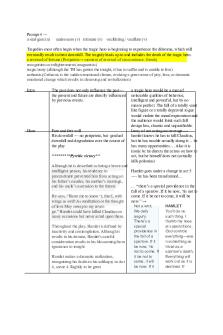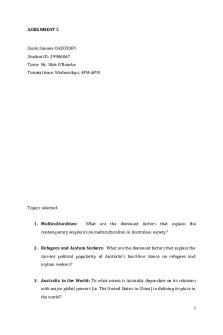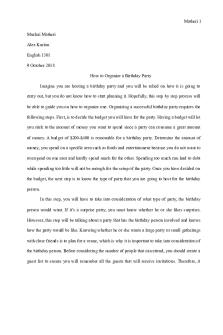Mktg203 essay 2 PDF

| Title | Mktg203 essay 2 |
|---|---|
| Course | Consumer Behaviour |
| Institution | Macquarie University |
| Pages | 2 |
| File Size | 71.6 KB |
| File Type | |
| Total Downloads | 22 |
| Total Views | 125 |
Summary
lecture notes from mktg203...
Description
508 words How do your clothing preferences differ from those of your friends? What personality differences might explain why your preferences are different from those of other people? An individual’s clothing preferences are largely related to their personality. In this case when comparing my clothing choices to my friends and other people, it largely corresponds to the characteristics of my personality as demonstrated through my personality test. Various factors contribute to the differing preferences of clothing within individuals relating to personality, including consumer susceptibility to interpersonal influence and trait theory. When comparing my clothing preferences to my friend’s l can clearly identify that l prefer more branded and stylish clothes. Although my friendship group tend to wear the same nature of clothing, my personality test results of encompassing natural leadership and charisma corresponds with my preference for more expensive, branded clothes to ensure that l stand out and give a good impression as well as always look good. These personality differences further explain why my preferences may differ from others. Trait theory describes an individual’s personality as a combination of specific traits where leaders and followers can be identified (Fleeson and Jayawickreme, 2015). My traits of charisma, reliability, tolerance, altruistic and a high level of extraversion relate to my strength of being a natural leader (16personalities.com, 2019). This clearly correlates with my clothing choices as my charisma allows a level of popularity where l seek to stand out when in a crowd or group through my increased confidence and extraversion. My stylish outfit choices through expensive brands such as Kookai presents a first impression of confidence, seriousness and importance aided by my natural leader personality. Statistically significant results highlight the association of clothing preferences and a person’s identity and personality (Feinberg, Mataro and Burroughs, 1992). Belk also proposed that the clothes we wear are an extension of one’s self (Belk, 1988). Further, it has been found that confident females are more inclined to experiment with their clothing in relation to their body’s physical qualities and prefer those styles of clothing that compliment these qualities (Kernaleguen, 1973). My increased extraversion and confidence allows me to wear those branded clothes that compliment and show off my body most. These preferences differ from other people who may prefer more ordinary, less branded and expensive clothes who do not prefer to stand out due to their personality. However, compared to other people my personality weaknesses include fluctuating selfesteem where criticism is sought out of insecurity rather than confidence where occasionally l wonder what l could do better (16personalities.com, 2019). Consumer susceptibility to interpersonal influence is the need to heighten one’s image in the opinion of others (Bearden, Netemeyer and Teel, 1989). Studies have shown that an individual’s level of selfesteem may determine their susceptibility to interpersonal influence. Those who are susceptible are more likely to wear clothing related to expensive brands to ensure they stand out (Bearden, Netemeyer and Teel, 1989). Thus, my occasional lack of self-esteem directly relates to my preferences of expensive and branded clothes in combination with my charisma and leadership qualities. Overall, trait theory and consumer susceptibility to interpersonal influence highlights the relation between clothing preferences and personality as demonstrated through my personality test where my preferences differ to my friends and others as a result.
508 words References Bearden, W., Netemeyer, R. and Teel, J. (1989). Measurement of Consumer Susceptibility to Interpersonal Influence. Journal of Consumer Research, 15(4), p.473. Belk, R. (1988). Possessions and the Extended Self. Journal of Consumer Research, 15(2), p.139. Feinberg, R., Mataro, L. and Burroughs, W. (1992). Clothing and Social Identity. Clothing and Textiles Research Journal, 11(1), pp.18-23. Fleeson, W. and Jayawickreme, E. (2015). Whole Trait Theory. Journal of Research in Personality, 56(1), pp.82-92. 16personalities.com. (2019). Free personality test, type descriptions, relationship and career advice | 16Personalities. [online] Available at: https://www.16personalities.com/ [Accessed 6 Sep. 2019]. Kernaleguen, A. (1973). Selected Perceptual and Personality Variables Related to Orientation to Clothing. Perceptual and Motor Skills, 36(3), pp.843-848....
Similar Free PDFs

Mktg203 essay 2
- 2 Pages

Essay 2
- 5 Pages

Essay 2
- 2 Pages

Tort Essay - Grade: 2:2
- 4 Pages

Essay 2 - Grade: 2:1
- 14 Pages

EC2 Essay PT 2
- 3 Pages

Essay 2 outline
- 4 Pages

Asessment 2 - Essay
- 6 Pages

ATS2269 Essay 2
- 10 Pages

Formal Essay Stage 2
- 7 Pages

Project 2- Essay
- 2 Pages

HLSC111 Assignment 2 Essay
- 7 Pages

Essay 2 - Grade: 85.1%
- 5 Pages

Essay no 2 draft
- 5 Pages

Essay 2 Birthday party
- 4 Pages

Essay 2 - Grade: A-
- 4 Pages
Popular Institutions
- Tinajero National High School - Annex
- Politeknik Caltex Riau
- Yokohama City University
- SGT University
- University of Al-Qadisiyah
- Divine Word College of Vigan
- Techniek College Rotterdam
- Universidade de Santiago
- Universiti Teknologi MARA Cawangan Johor Kampus Pasir Gudang
- Poltekkes Kemenkes Yogyakarta
- Baguio City National High School
- Colegio san marcos
- preparatoria uno
- Centro de Bachillerato Tecnológico Industrial y de Servicios No. 107
- Dalian Maritime University
- Quang Trung Secondary School
- Colegio Tecnológico en Informática
- Corporación Regional de Educación Superior
- Grupo CEDVA
- Dar Al Uloom University
- Centro de Estudios Preuniversitarios de la Universidad Nacional de Ingeniería
- 上智大学
- Aakash International School, Nuna Majara
- San Felipe Neri Catholic School
- Kang Chiao International School - New Taipei City
- Misamis Occidental National High School
- Institución Educativa Escuela Normal Juan Ladrilleros
- Kolehiyo ng Pantukan
- Batanes State College
- Instituto Continental
- Sekolah Menengah Kejuruan Kesehatan Kaltara (Tarakan)
- Colegio de La Inmaculada Concepcion - Cebu